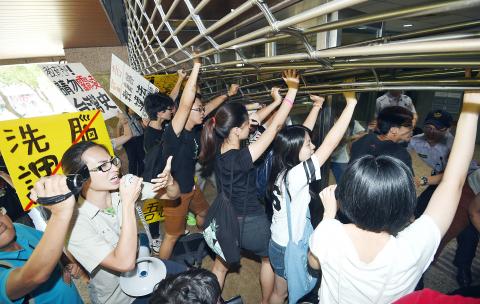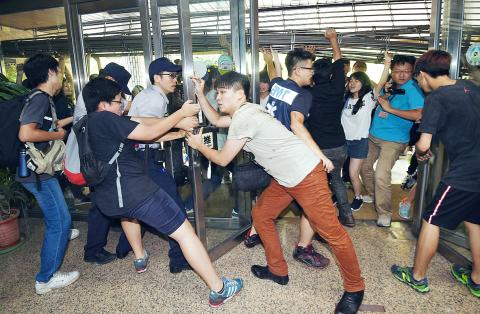Students forced their way into the K-12 Education Administration building in Taipei yesterday, promising further action by the end of the week if controversial high-school curriculum guidelines are not withdrawn.
About 50 students gathered at the agency’s building — part of the Ministry of Education — at about 3pm, seeking to present their demands to agency officials.
Thirteen forced their way into building before employees pulled a metal gate in front of the entrance.

Photo: Lo Pei-der, Taipei Times
A standoff followed, as students outside the building forced the gate up, but were unable to break through an interior police cordon.
The ministry lacked sincerity when responding to student requests that the guidelines be withdrawn and instead just repeated prior statements, Northern Taiwan Anti-Curriculum Changes Alliance convener Chu Chen (朱震) said.
Chu demanded that the ministry guarantee the safety of students inside the building and select an official to accept their petition.

Photo: Lo Pei-der, Taipei Times
Students yelled slogans such as: “Oppose brainwashing guidelines, open up black box procedures.” They also demanded that ministry officials “open up the iron gates and let our comrades go.”
Students inside the building made their way to the fifth-floor office of K-12 Administrator Director Wu Ching-shan (吳清山), looking for someone to receive their concerns after failing to find Wu.
Adjustments to high-school curriculum guidelines have generated controversy for what critics describe as a “China-centric” focus.
The protest yesterday came on a deadline students had imposed for the guidelines to be withdrawn.
The K-12 Education Administration is responsible for implementing the guidelines and represented a softer target than the ministry building, which has been barricaded with barbed wire and cast-iron doors in recent weeks.
The police force at the ministry took more than 10 minutes to reach the K-12 Education Administration building, which is several blocks from the ministry.
After police reinforcements arrived, a 10-minute standoff occurred before students let go of the gate and sat silently in front of the building, urging that students who made it inside be allowed to exit and that officials emerge to face their concerns.
Later, Han Chun-shu (韓春樹), deputy head of the agency’s secondary and vocational education division, led out the 13 students inside the building and issued a response to the protesters’ concerns, saying that the ministry would draft additional curriculum materials on the controversial portions of the guidelines by next month, allowing teachers to supplement textbooks with class discussion.
The students opted to withdraw, but repeated their dissatisfaction with the what they described as the “skipping needle” of the ministry’s responses.
They would return with more intense measures, they said, with their next moves to be posted online within a week.

NATIONAL SECURITY THREAT: An official said that Guan Guan’s comments had gone beyond the threshold of free speech, as she advocated for the destruction of the ROC China-born media influencer Guan Guan’s (關關) residency permit has been revoked for repeatedly posting pro-China content that threatens national security, the National Immigration Agency said yesterday. Guan Guan has said many controversial things in her videos posted to Douyin (抖音), including “the red flag will soon be painted all over Taiwan” and “Taiwan is an inseparable part of China,” while expressing hope for expedited “reunification.” The agency received multiple reports alleging that Guan Guan had advocated for armed reunification last year. After investigating, the agency last month issued a notice requiring her to appear and account for her actions. Guan Guan appeared as required,

A strong cold air mass is expected to arrive tonight, bringing a change in weather and a drop in temperature, the Central Weather Administration (CWA) said. The coldest time would be early on Thursday morning, with temperatures in some areas dipping as low as 8°C, it said. Daytime highs yesterday were 22°C to 24°C in northern and eastern Taiwan, and about 25°C to 28°C in the central and southern regions, it said. However, nighttime lows would dip to about 15°C to 16°C in central and northern Taiwan as well as the northeast, and 17°C to 19°C elsewhere, it said. Tropical Storm Nokaen, currently

PAPERS, PLEASE: The gang exploited the high value of the passports, selling them at inflated prices to Chinese buyers, who would treat them as ‘invisibility cloaks’ The Yilan District Court has handed four members of a syndicate prison terms ranging from one year and two months to two years and two months for their involvement in a scheme to purchase Taiwanese passports and resell them abroad at a massive markup. A Chinese human smuggling syndicate purchased Taiwanese passports through local criminal networks, exploiting the passports’ visa-free travel privileges to turn a profit of more than 20 times the original price, the court said. Such criminal organizations enable people to impersonate Taiwanese when entering and exiting Taiwan and other countries, undermining social order and the credibility of the nation’s

‘SALAMI-SLICING’: Beijing’s ‘gray zone’ tactics around the Pratas Islands have been slowly intensifying, with the PLA testing Taiwan’s responses and limits, an expert said The Ministry of National Defense yesterday condemned an intrusion by a Chinese drone into the airspace of the Pratas Islands (Dongsha Islands, 東沙群島) as a serious disruption of regional peace. The ministry said it detected the Chinese surveillance and reconnaissance drone entering the southwestern parts of Taiwan’s air defense identification zone early yesterday, and it approached the Pratas Islands at 5:41am. The ministry said it immediately notified the garrison stationed in the area to enhance aerial surveillance and alert levels, and the drone was detected in the islands’ territorial airspace at 5:44am, maintaining an altitude outside the effective range of air-defense weaponry. Following